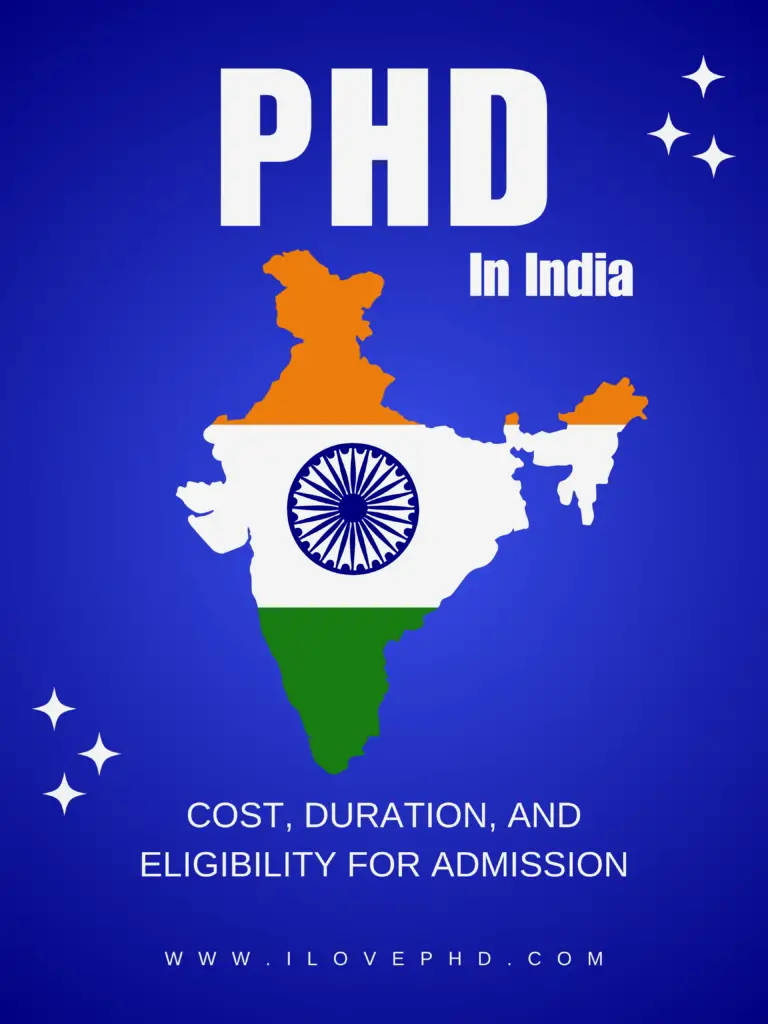Embarking on a PhD journey in India is a significant academic and professional pursuit. Aspiring research scholars often have questions regarding the duration of a PhD, the associated costs, eligibility criteria, and recent developments in the field. In this comprehensive guide, ilovephd aims to address these queries and shed light on the essentials of pursuing a PhD in India.
Complete Guide to PhD in India: Duration, Costs, Eligibility, and Recent Updates 2025
How many years is a PhD in India?
A PhD program in India typically takes around 3 to 5 years to complete, depending on various factors such as the discipline, research area, individual progress, and university regulations.
The duration may vary, but it is important to be prepared for a substantial commitment of time and effort.
How much does a PhD cost in India?
The cost of pursuing a PhD in India varies across institutions. Generally, public universities offer PhD programs with minimal or subsidized tuition fees. Private universities may have higher fees.
It’s advisable to explore funding options such as scholarships, fellowships, or research grants provided by government bodies, funding agencies, or individual institutions to support your PhD journey.
What qualifications are required for a PhD in India?
To pursue a PhD in India, a candidate typically needs a postgraduate degree (Master’s or equivalent) in a relevant field. It is important to note that specific eligibility criteria may vary between universities and disciplines.
Additionally, universities often require candidates to clear entrance exams or interviews and meet minimum academic standards to be considered for admission.
What is the age limit for a PhD in India? Is 25 too old to start a PhD?
In most cases, there is no strict age limit for pursuing a PhD in India. As long as you meet the eligibility criteria and demonstrate the necessary academic qualifications, you can pursue a PhD at any age.
Therefore, 25 is certainly not too old to start a PhD Many scholars begin their doctoral studies later in life, bringing valuable experiences and perspectives to their research.
Can I do a Ph.D. without the National Eligibility Test (NET)?
While the National Eligibility Test (NET) is a common requirement for lectureships and research fellowships in India, it is not mandatory for all PhD programs. Some universities may have their own entrance exams or selection processes.
It is important to check the specific requirements of the university or institution where you plan to pursue your PhD
Who is eligible for direct PhD admission?
Direct Ph.D. admission is a pathway for exceptional candidates who have completed their undergraduate studies and wish to pursue a PhD without a Master’s degree.
However, this option is typically available to a limited number of candidates, and universities may have specific criteria and guidelines for direct PhD admissions. It is advisable to consult with individual institutions to understand their policies regarding direct Ph.D. admissions.
Is it okay to do a PhD without a Master’s degree?
While a Master’s degree is generally the standard qualification for pursuing a PhD, some universities in India offer integrated PhD programs that allow students to directly enter the Ph.D. track after completing their undergraduate studies.
However, this option may be limited to certain disciplines or institutions. It’s important to research and identify institutions that offer such programs if you wish to pursue a PhD without a Master’s degree.
What are the recent rules for PhD admissions in India?
The rules and regulations for Ph.D. admissions in India are subject to change and can vary between universities and disciplines.
It is advisable to stay updated with the guidelines provided by individual universities and regulatory bodies such as the University Grants Commission (UGC) or the All India Council for Technical Education (AICTE) to ensure compliance with the latest requirements.
25 Tips to Join PhD in India
25 tips to help you join a PhD program in India:
- Research your field of interest thoroughly to identify potential research areas and topics.
- Explore various universities and research institutes in India that offer PhD programs in your chosen field.
- Check the eligibility criteria and admission requirements of each institution you are interested in.
- Take note of application deadlines and ensure you submit your application well in advance.
- Prepare a strong statement of purpose (SOP) that highlights your research interests, goals, and why you are interested in pursuing a Ph.D.
- Contact potential supervisors or faculty members whose research aligns with your interests to discuss your research proposal.
- Prepare for entrance exams that may be required for admission, such as the UGC-NET, GATE, or university-specific entrance exams.
- Enhance your academic profile by participating in research projects, publishing papers, or presenting at conferences.
- Build a strong recommendation letter portfolio by reaching out to professors or mentors who can attest to your academic abilities and research potential.
- Seek out scholarships, fellowships, or research grants offered by government bodies, universities, or funding agencies to fund your Ph.D.
- Familiarize yourself with the research facilities, laboratories, and resources available at the institutions you are considering.
- Attend research seminars, workshops, and conferences related to your field to stay updated with the latest developments and network with researchers.
- Develop good communication and writing skills, as they are essential for presenting research findings and publishing papers.
- Create a well-structured and feasible research proposal that clearly outlines your research objectives, methodology, and expected outcomes.
- Be prepared for interviews or presentations as part of the selection process, where you may need to defend your research proposal or discuss your academic background.
- Gain teaching experience by assisting professors or taking up teaching assignments to enhance your profile for future academic positions.
- Connect with current Ph.D. students or alumni of the institutions you are interested in to gain insights into the program and research environment.
- Stay updated with any changes in the rules, regulations, or policies related to Ph.D. admissions in India.
- Develop a strong work ethic and time management skills, as PhD programs require dedication, self-discipline, and long hours of research.
- Consider the location and infrastructure of the institution, ensuring it suits your research needs and provides a conducive environment for learning.
- Explore interdisciplinary opportunities and collaborations to broaden your research scope and gain different perspectives.
- Discuss funding options and financial support with the institutions you are applying to, and be prepared to seek external funding if necessary.
- Keep track of your research progress and maintain regular communication with your supervisor or mentor.
- Attend preparatory courses or workshops on research methodology or academic writing to enhance your research skills.
- Finally, be passionate, persistent, and proactive in pursuing your PhD dream. Embrace the challenges, stay motivated, and enjoy the journey of knowledge creation.
Remember, each institution may have its specific requirements and procedures, so it’s crucial to carefully review their official websites or contact the admissions offices for accurate and up-to-date information.
10 Steps to Join PhD in India
Here are 10 steps to join a PhD program in India:
- Research your field: Explore different research areas and identify your specific field of interest for pursuing a PhD in India.
- Shortlist institutions: Identify universities or research institutes in India that offer PhD programs in your chosen field.
- Review eligibility criteria: Check the eligibility requirements of the institutions you are interested in, including minimum educational qualifications and entrance exam scores.
- Prepare application documents: Gather the necessary documents, such as academic transcripts, recommendation letters, statement of purpose (SOP), and research proposal.
- Prepare for entrance exams: If required, prepare for entrance exams like UGC-NET, GATE, or university-specific exams. Familiarize yourself with the syllabus and exam pattern.
- Apply to institutions: Submit your applications to the shortlisted institutions within the specified deadlines. Pay attention to the required application fees and submission procedures.
- Attend interviews (if applicable): Some institutions may conduct interviews or presentations to assess your research aptitude and fit for the program. Prepare well for these interactions.
- Secure funding: Explore funding opportunities such as scholarships, fellowships, or research grants. Check if the institutions offer any financial support or external funding options.
- Accept an offer: After receiving acceptance letters from the institutions you applied to, carefully evaluate and select the most suitable offer based on research facilities, faculty expertise, funding, and overall fit.
- Complete admission formalities: After accepting an offer, complete the necessary admission formalities as specified by the institution. This may include submitting additional documents, paying fees, and fulfilling any other requirements.
It’s important to note that the specific steps and procedures may vary between institutions. Therefore, always refer to the official websites and admission guidelines of the institutions you are applying to for accurate and up-to-date information.
Summary
Pursuing a PhD in India is a rewarding and intellectually stimulating endeavor. Understanding the duration, costs, eligibility criteria, and recent developments is crucial to navigating the process effectively.
By considering these factors and conducting thorough research, aspiring Ph.D. scholars can embark on their academic journey confidently and clearly.
Remember to contact universities or institutions directly for specific information and seek guidance from mentors or faculty members who can provide valuable insights into the PhD application process in your chosen field. Good luck with your Ph.D. pursuit!

Also Read: Best 100 Institutions to Study PhD in India – 2025

